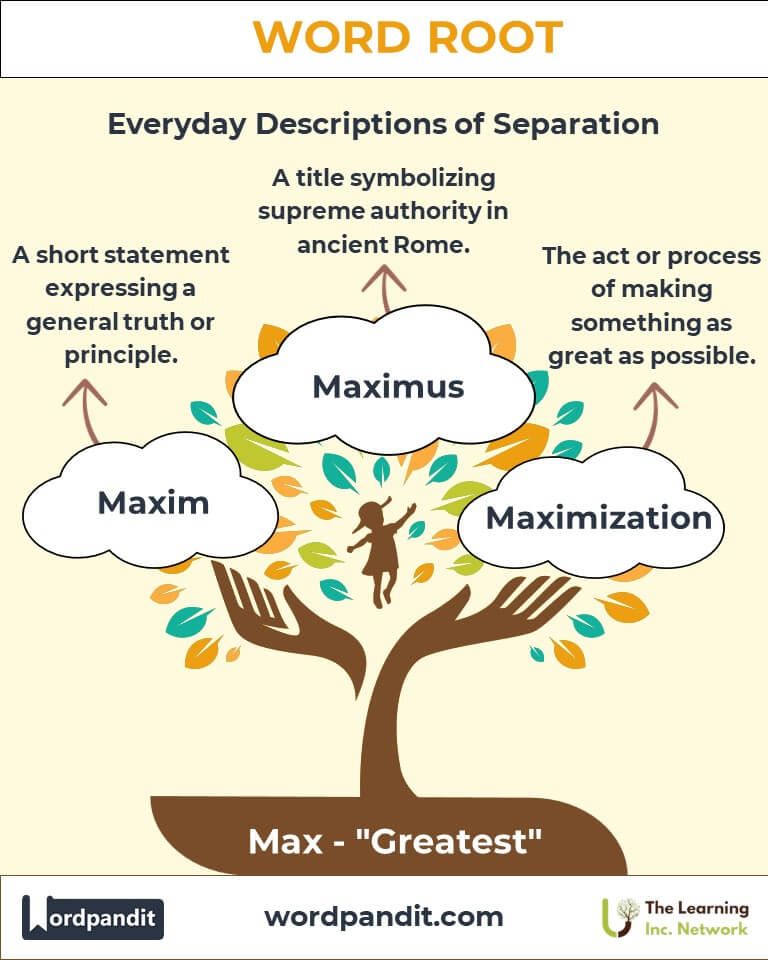Max: The Root of Greatness in Language and Beyond
Discover the powerful root "max," derived from Latin, meaning "greatest." This root forms the foundation of words like "maximum" and "maximize," which convey ideas of reaching the highest level. Explore how this root connects to the language of ambition, measurement, and achievement.
Table of Contents
- Introduction: The Significance of "Max"
- Etymology and Historical Journey
- Mnemonic: Unlocking the Power of "Max"
- Common Max-Related Terms
- Max Through Time
- Max in Specialized Fields
- Illustrative Story: "Max" in Action
- Cultural Significance of "Max"
- The "Max" Family Tree
- FAQs About the agr Word Root
- Test Your Knowledge: agr Word Root Quiz
- Conclusion: The Everlasting Appeal of "Max"
Introduction: The Significance of "Max"
What does it mean to be the greatest? The root "max," pronounced maks, captures this idea of reaching the highest, most excellent state. Originating from the Latin word maximus (greatest), this root forms the basis of terms in mathematics, science, and everyday language. Words like "maximum" and "maximize" illustrate our constant desire to achieve and measure the utmost potential.

Etymology and Historical Journey
The root "max" derives from the Latin maximus, a superlative of magnus (great). In ancient Rome, maximus referred to the highest authority, as seen in titles like Pontifex Maximus, the chief priest. The concept of "greatest" persisted through Old French into Middle English, eventually forming words like "maximum" in the 18th century. Today, "max" remains a marker of excellence and aspiration across languages.
Mnemonic: Unlocking the Power of "Max"
To remember "max," picture a towering mountain labeled "MAX" with a flag at its peak. It symbolizes the ultimate achievement—reaching the greatest height.
Mnemonic Device: “Max marks the summit—the greatest point of achievement.”
Common Max-Related Terms
- Maximum (mak-sih-mum): The greatest amount or degree possible.
Example: "The thermometer hit its maximum temperature on a scorching summer day."
- Maximize (mak-sih-mize): To increase to the greatest possible amount or degree.
Example: "The company aims to maximize profits through efficient strategies."
- Maximal (mak-sih-muhl): Relating to the highest or greatest extent.
Example: "The athlete achieved maximal performance during the competition."
- Maxim (mak-sim): A short statement expressing a general truth or principle.
Example: "His favorite maxim was 'Fortune favors the brave.'"
- Maximization (mak-sih-muh-zay-shun): The act or process of making something as great as possible.
Example: "The software's design ensures the maximization of user engagement."
Max Through Time
- Maximus (Ancient Rome):
Title symbolizing supreme authority.
Example: Pontifex Maximus highlighted the role of the greatest religious leader.
- Maximum (18th Century):
Shifted from describing philosophical ideals to precise scientific measurements.
Example: The term gained popularity in physics and engineering during the Industrial Revolution.
Max in Specialized Fields
- Mathematics:
Maximum: The greatest value in a set or function.
Example: "Find the maximum of the quadratic equation."
- Business:
Maximize: Common in profit and efficiency optimization strategies.
Example: "Maximize customer satisfaction through personalized service."
- Fitness:
Maximal Effort: Refers to the highest physical performance achievable.
Example: "The test measured the athlete's maximal oxygen uptake."
- Technology:
Maximization Algorithms: Used in data analysis and artificial intelligence.
Example: "Algorithms maximize the efficiency of machine learning models."
Illustrative Story: "Max" in Action
Emma, a young entrepreneur, had one goal: to maximize the potential of her eco-friendly startup. She used innovative strategies to ensure her company's products reached maximum impact. From minimizing waste to maximizing efficiency, her team’s motto was inspired by a simple maxim: "Do the greatest good for the greatest number." Through perseverance, Emma not only achieved success but also redefined what it means to be great.
Cultural Significance of "Max"
The concept of "max" resonates globally. From Roman titles like Maximus to modern phrases like "to the max," this root reflects humanity's enduring pursuit of greatness. Films like Gladiator immortalize the name Maximus as a symbol of heroism, while everyday expressions like "maximize your potential" inspire self-improvement and ambition.

The "Max" Family Tree
- Magn (Latin: "great"):
- Magnify: To make something appear greater.
- Magnanimous: Showing greatness of spirit.
- Suprem (Latin: "highest"):
- Supreme: Of the highest rank or quality.
- Supremacy: The state of being supreme.
- Ultra (Latin: "beyond"):
- Ultramax: Exceeding the maximum.

FAQs About the "Max" Word Root
Q: What does "max" mean?
A: "Max" comes from the Latin maximus, meaning "greatest." It denotes the highest, largest, or most significant amount or degree, often used in contexts emphasizing peak levels of achievement or measurement.
Q: Where do we encounter "max" in everyday life?
A: The root "max" is prevalent in phrases like "maximize your potential" or "to the max," which emphasize reaching the fullest capacity. It also appears in technical terms, such as "maximum speed" or "maximum effort," highlighting its versatility in casual and formal language.
Q: What is the difference between "maximum" and "maximize"?
A:
- Maximum: Refers to the greatest possible amount or degree, such as "maximum capacity."
- Maximize: A verb that means to increase something to its greatest possible amount or degree, as in "maximize productivity."
Q: What is a maxim, and how is it related to "max"?
A: A maxim is a concise statement expressing a general truth or principle, such as "Honesty is the best policy." It relates to the "max" root because it embodies ideas that are considered the greatest or most significant insights about life.
Q: Is "max" used in scientific contexts?
A: Yes, "max" is used frequently in science and mathematics. For example, in physics, "maximum velocity" refers to the highest speed an object can reach. In calculus, "maximum" describes the greatest value of a function on a given interval.
Q: How has the word "max" evolved historically?
A: "Max" originated from the Latin maximus and was adopted into English through Middle French. It first referred to titles of greatness, such as "Pontifex Maximus" in Ancient Rome, and later became integral to terms like "maximum" in mathematical and scientific contexts.
Q: Are there modern expressions using "max"?
A: Yes, phrases like "push it to the max" or "max out your potential" are common. They reflect the root’s association with peak performance and striving for the highest level.
Test Your Knowledge: Max Word Root Quiz
1. What does "max" mean?
2. Which term means "to increase to the greatest degree"?
3. What does "maximum" describe in mathematics?
4. What is a "maxim"?
5. Which root is related to "max"?
Conclusion: The Everlasting Appeal of "Max"
The root "max" serves as a timeless symbol of greatness and ambition. From ancient titles to modern algorithms, it continues to inspire achievement and excellence. As language evolves, "max" remains a constant reminder of our potential to reach the highest heights. Let it motivate you to maximize your abilities and aim for greatness.












